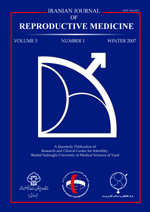
|
International Journal of Reproductive BioMedicine
Research and Clinical Center for Infertility, Shahid Sadoughi University of Medical Sciences of Yazd
ISSN: 1680-6433
EISSN: 1680-6433
Vol. 12, No. 10, 2014, pp. 661-666
|
 Bioline Code: rm14092
Bioline Code: rm14092
Full paper language: English
Document type: Research Article
Document available free of charge
|
|
|
International Journal of Reproductive BioMedicine, Vol. 12, No. 10, 2014, pp. 661-666
| en |
Transvaginal perfusion of G-CSF for infertile women with thin endometrium in frozen ET program: A non-randomized clinical trial
Eftekhar, Maryam; Sayadi, Mozhgan & Arabjahvani, Farideh
Abstract
Background: We often see patients with a thin endometrium in ART cycles, in spite of standard and adjuvant treatments. Improving endometrial growth in patients with a thin endometrium is very difficult. Without adequate endometrial thickness these patients, likely, would not have reached embryo transfer.
Objective: We planned this study to investigate the efficacy of intrauterine granulocyte colony-stimulating factor (G-CSF) perfusion in improving endometrium, and possibly pregnancy rates in frozen-thawed embryo transfer cycles.
Materials and Methods: This is a non-randomized intervention clinical trial. Among 68 infertile patients with thin endometrium (-7 mm) at the 12th-13th cycle day, 34 patients received G-CSF. G-CSF (300 microgram/1mL) to improve endometrial thickness was direct administered by slow intrauterine infusion using IUI catheter. If the endometrium had not reached at least a 7-mm within 48-72 h, a second infusion was given. Endometrial thickness was assessed by serial vaginal ultrasound at the most expanded area of the endometrial stripe.
Results: The cycle was cancelled in the patients with thin endometrium (endometrial thickness below 7mm) until 19th cycle day ultimately The cycle cancelation rate owing to thin endometrium was similar in G-CSF group (15.20%), followed by (15.20%) in the control group (p=1.00). The endometrial growth was not different within 2 groups, an improvement was shown between controlled and G-CSF cotreated groups, with chemical (39.30% vs. 14.30%) and clinical pregnancy rates (32.10% vs. 12.00%) although were not significant.
Conclusion: Our study fails to demonstrate that G-CSF has the potential to improve endometrial thickness but has the potential to improve chemical and clinical pregnancy rate of the infertile women with thin endometrium in frozen-thawed embryo transfer cycle.
Keywords
Thin endometrium; Granulocyte colony stimulating factor; Frozen thawed embryo transfer; Pregnancy rate
|
| |
© Copyright 2014 - Iranian Journal of Reproductive Medicine
Alternative site location: http://www.ijrm.ir
|
|
